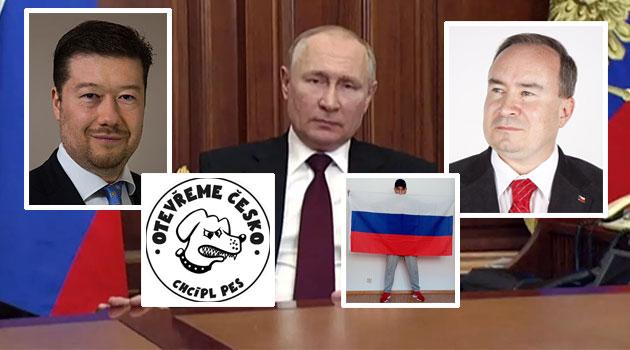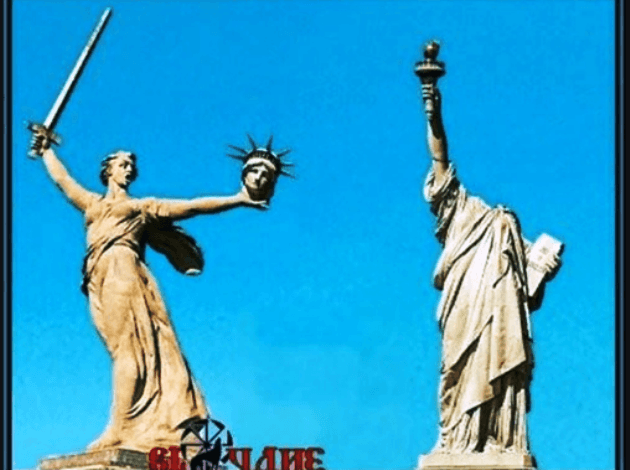Czech disinformation scene sharing pro-Kremlin lies and propaganda, including from opposition and extremist politicians

Czech-language disinformation groups that have been spreading nonsense about the COVID-19 pandemic or about vaccination over the past few months are changing the subject after the latest Russian invasion of Ukraine. The same circle of people who first spread disinformation about the Roma, then about refugees, and then about the novel coronavirus is now beginning to share pro-Kremlin content against NATO and the West.
One example pointed out by news server Deník N is the manipulative Facebook group “Neočkovaní CZ, SK” [Unvaccinated Czech Republic, Slovakia], which currently has over 20 000 members. For several days now, however, the topic of Russia’s war on Ukraine has appeared among its posts.
The group has begun to spread manipulative messages such as: “NATO has started threatening Russia” or “Who is the aggressor: the United States or Russia?”. In addition, it has changed its name to “Neočkovaní CZ, SK pro míru! Ne válce!” [Unvaccinated Czech Republic, Slovakia for peace! Not wars!]
The “Chcípl PES” [The Dog Has Died] initiative, which has been organizing demonstrations against compulsory vaccination or the pandemic law that were regularly attended by the chair of the extremist Workers’ Social Justice Party (DSSS), Tomáš Vandas, posted before the recent invasion that Putin would have no choice but to intervene in the separatist republics where an alleged “genocide” is taking place. The initiative blames the USA for the situation.
Czech MP Tomio Okamura and Vandas have expressed similar views on their own social media. A demonstration in Prague in support of Russia’s current actions is being organized for Saturday by Patrik Tušl and Tomáš Čermák, who in recent months have been verbally attacking doctors for explaining the importance of vaccination against COVID-19.
The Czech Interior Ministry has also reported seeing a gradual reorientation throughout the disinformation scene toward the Russian-Ukrainian crisis. “From the findings of open source monitoring, it can be stated that the issue of potential conflict in Ukraine is appearing on sites and groups focused on criticism of vaccinations and other anti-pandemic measures,” Hana Malá, a spokeswoman for the ministry, responded to questions from Deník N.
How Russian sources create the impression of Ukrainian aggression
Representatives of the European Union (EU) and the North Atlantic Treaty Organization (NATO) have also been drawing attention to the emergence of pro-Kremlin misinformation that is beginning to go viral and have repeatedly warned in recent weeks that the Russian Government and its allies will try to fabricate an excuse to send Russian troops into Ukraine. Independent analysts and media outlets are now agreeing with western officials who, with the help of materials that are publicly available, have been drawing attention to the dubious videos being used by the Kremlin as evidence of alleged Ukrainian “aggressions”.
According to some commentators, the current practices of the pro-Kremlin channels are completely transparent. The New York Times (NYT), in a podcast about the Donbas on Tuesday, mentioned a Friday incident alleging that both a gas pipeline and a car belonging to the head of the local, Russian-backed insurgent security forces had exploded in Donetsk.
NYT reporters, however, found that the vehicle that was destroyed had not actually belonged to that particular agent, while the alleged footage of the pipeline explosion had actually been taken last summer. The CNN television channel and the VICE website have also focused on videos that began to be broadcast by the Russian media on Monday with Moscow’s statements that it had thwarted the action of Ukrainian “diversionists” and that some places in Russia’s Rostov region had come under Ukrainian fire.
“The videos that emerged as alleged evidence of those incidents were not exactly what the Russian media portrayed them as,” CNN writes. According to the American television network, the two video clips, published as footage from places allegedly damaged by Ukrainian fire, were shot in the same locality just a few meters apart, but some Russian media spoke of the places as hundreds of kilometers apart.
According to CNN, a comparison of the shots with landscape images showed that both videos were of places on the border between Russia and the self-proclaimed Donetsk People’s Republic, not on the border of Russia with Ukraine proper. Analysts have also revealed something similar in the case of the footage associated by Russian media with alleged Ukrainian “sabotage”.
Internet detectives catch the Kremlin in its lies
“Internet detectives” who search for the origins of disputed footage with the help of images from satellites or the “metadata” accompanying the online files are playing an important role in clarifying possible misinformation. Probably the most well-known actor in this field is the Bellingcat investigative group, which has been providing information on events in eastern Ukraine or Russian intelligence incidents for a long time.
“Russia has a long tradition of such committing such actions. It’s not surprising,” Elliot Higgins, the group’s founder, told The Guardian newspaper.
In an article published Monday, that paper dealt in detail with another example of the propaganda videos coming from Russian sources these days; the video, which appeared online at the end of last week, showed a nighttime scene in the woods with an unidentified man. Russian state television described him as an allegedly Ukrainian “saboteur” whose task was to blow up a factory in a part of the Donbas controlled by pro-Russian separatists.
The soundtrack used for the clip is more than 10 years old, however. The footage was probably produced in Finland, writes The Guardian.
“These are really some of the most idiotic attempts at misinformation I’ve seen … The poor quality of this propaganda actually offends me,” Higgins tweeted of this development.
That same day, the British newspaper The Daily Telegraph published an article about four Russian attempts to portray Ukraine as an aggressor “which can be refuted comically easily”, but experts note that for a large part of the Russian public, such manipulations may be credible. At the same time, these allegations can add weight to the arguments of the Russian Government, which has long criticized the Government in Kiev and presented it as a threat to Russia or to the Russian-speaking people of Ukraine.
CNN notes that the alleged shelling of Russian territory and Ukraine’s allegedly attempted “sabotage” were also discussed at the meeting of Russian President Vladimir Putin’s Security Council on Monday after which the head of the Kremlin recognized the independence of the separatist “people’s republics” in the Donbas. Putin immediately announced the deployment of troops to the area under the pretext of “peacekeeping”, while Kiev denies having shelled or having planned to attack areas controlled by pro-Russian forces.
